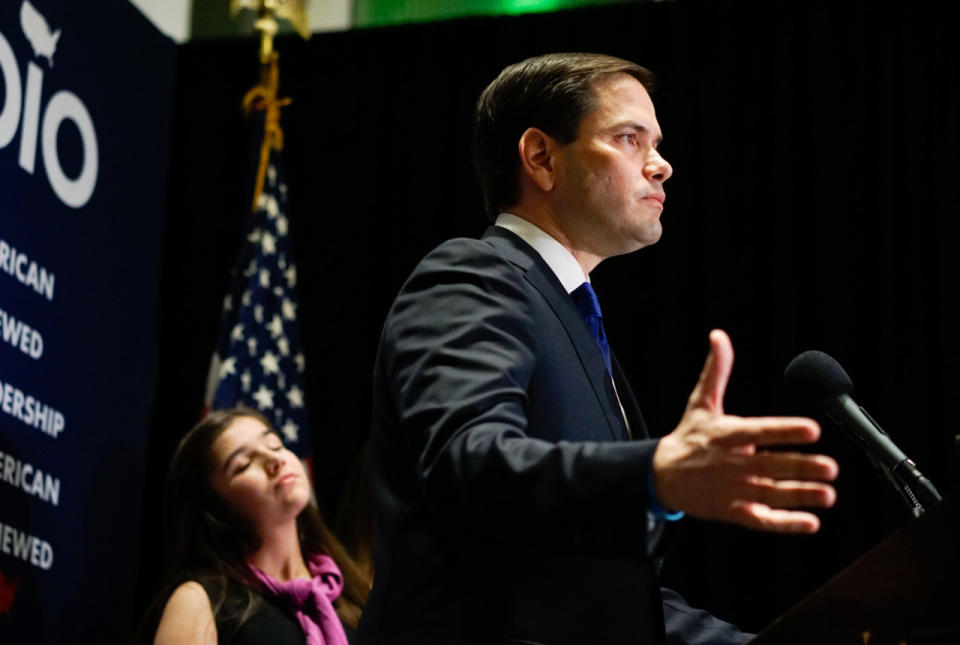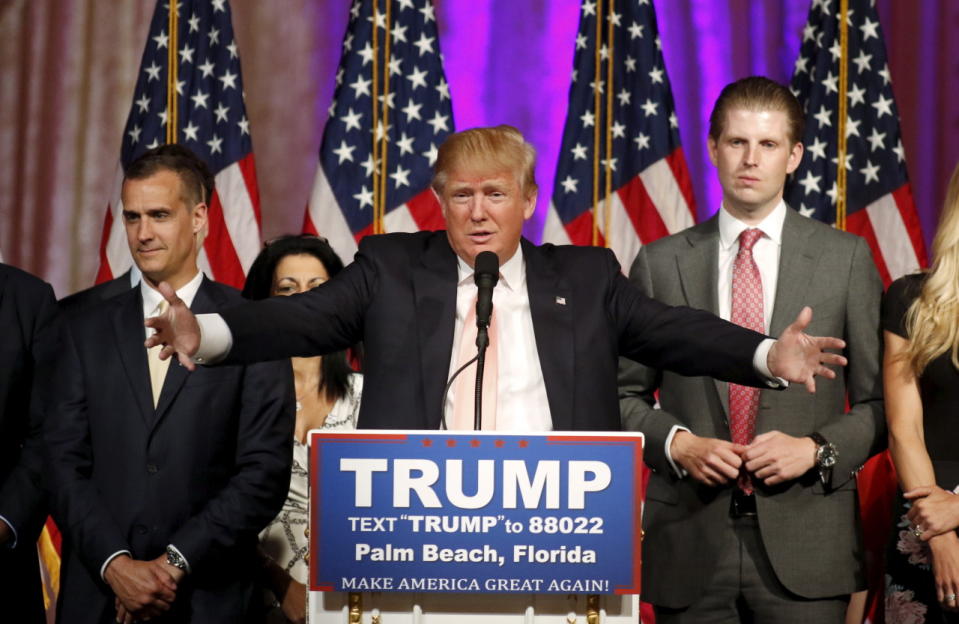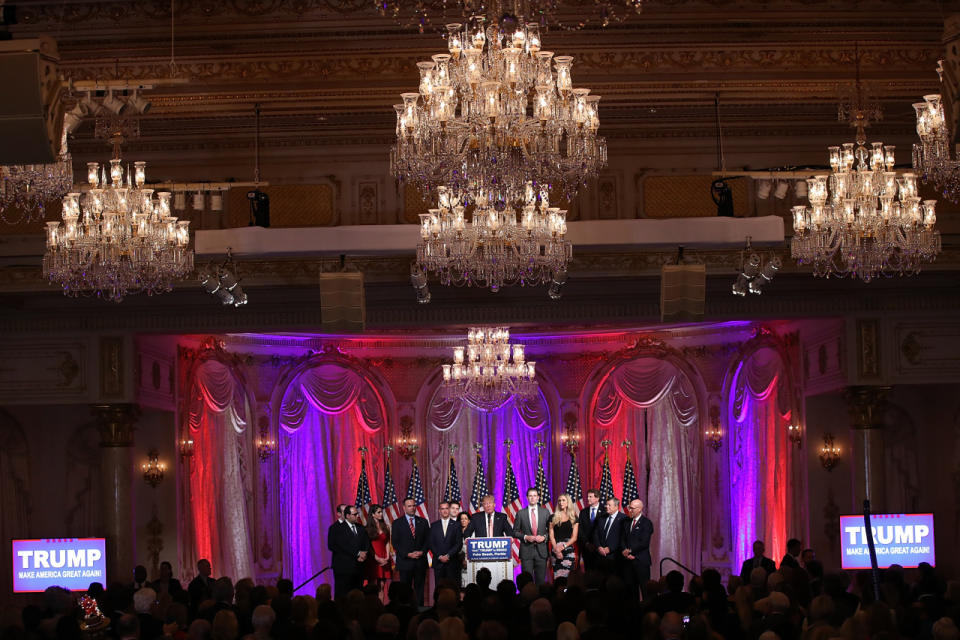Trump has a big night, knocks Rubio out of the race
PALM BEACH, Fla. — Donald Trump took a major step toward the Republican nomination Tuesday night, winning presidential primary races in Florida, Illinois and North Carolina (with Missouri declared too close to call after vote-counting was suspended late into the night). Trump’s landslide victory in winner-take-all Florida represented a stunning defeat for home-state Sen. Marco Rubio, who suspended his campaign for the White House.
But Ohio Gov. John Kasich eked out a win in his home-state primary, denying Trump a much hoped for victory in the other crucial winner-take-all state of the night and increasing the likelihood of a contested GOP convention this summer.
While Trump nearly ran the table Tuesday, Illinois, North Carolina and Missouri (where he held a slim lead over Cruz) were not winner-take-all primaries, meaning that he will have to share the delegates awarded, once again prolonging the race for the GOP nomination.
And though Trump’s wins Tuesday looked to put him at least halfway to the 1,237 delegates he needs to claim the nomination, neither Kasich nor Cruz signaled any plans to leave the race. “Do you want a candidate who shares your values? Or a candidate who has spent decades opposing your values?” Cruz told his supporters at an election night rally in Houston.
For his part, Rubio did not immediately give up his delegates, delivering a concession speech that was more confrontational toward Trump than conciliatory. “The easiest thing to have done in this campaign [would have been] … to make people angrier, make people more frustrated,” Rubio said in a clear reference to Trump. “But I chose a different route, and I’m proud of that.
“In a year like this, that would have been the easiest way to win, but that is not what’s best for America,” Rubio added. “The politics of resentment against other people will not just leave us a fractured party, but they will leave a fractured nation … where people literally hate each other because they have different political opinions.”
Rubio’s slow decline over the last three months became precipitous after a series of crude attacks on Trump in late February failed spectacularly in the minds of many voters. Rubio’s broadsides against Trump during the Feb. 25 GOP debate in Houston spiraled down in the following days on the campaign trail into jokes about Trump wetting his pants and even a reference to the size of Trump’s penis, which the businessman later defended during a raucous debate in Detroit on March 3.

Sen. Marco Rubio, onstage with his family, tells supporters at a primary night rally in Miami that he is suspending his campaign for the Republican nomination. (Photo: Angel Valentin/Getty Images)
Slideshow: March 15 presidential primaries >>>
As he left his election night event Tuesday, Rubio pleaded with the electorate, “I ask the American people, do not give in to the fear. Do not give in to the frustration,” as supporters in the crowd wept. “America needs a vibrant conservative movement, but one that’s built on principles and ideas, not on fear, not on anger, not on preying on people’s frustrations.”
Trump, speaking to supporters at his Mar-a-Lago Club here, was surprisingly cordial toward his former rival, whom he had repeatedly ridiculed as “Little Marco” in campaign speeches as recently as Monday. But Trump, clearly trying to appear more presidential as he gains in his bid to be the party nominee, congratulated Rubio for running a tough campaign. “He’s got a bright future,” Trump said.
In some ways, Tuesday’s results marked a potential turning point for Trump’s insurgent campaign. After three straight weeks of significant victories — starting with carrying 7 of the 11 voting states on March 1, the original Super Tuesday — Trump has tried to cast himself in a more presidential light. He’s held election night press conferences instead of rallies and has, at moments, noticeably tried to tone down his fiery rhetoric toward his opponents, including at last week’s Republican debate in Miami. In recent days, he has repeatedly emphasized his ability to bring together not only a Republican Party at odds over his unlikely candidacy, but also a country that is deeply splintered across partisan lines.
“I’m a unifier,” Trump has insisted. “I’m actually a unifier.”
But even as he, at times, has affected a more dignified demeanor, he can’t seem to sustain it. Or perhaps he doesn’t want to, seeing political value in reflecting the raw anger of a wide swath of the Republican electorate. Either way, he has offered little evidence of how he would actually overcome his first major hurdle: establishment Republicans who have been highly critical of his charged rhetoric and vague — and occasionally apostate — policy positions.
In recent days, as his delegate count has ramped up, Trump has bragged that Republican bigwigs are now calling him. On Tuesday night, he talked up phone calls from Senate Majority Leader Mitch McConnell and House Speaker Paul D. Ryan — though a Ryan spokesman tweeted that his boss had called Trump at the candidate’s request, not vice versa.

Donald Trump, flanked by his campaign manager, Corey Lewandowski, left, and his son Eric, right, discusses the results of the Florida, Ohio, North Carolina, Illinois and Missouri primaries at a news conference held at his Mar-a-Lago Club in Palm Beach, Fla. (Photo: Joe Skipper/Reuters)
When asked about his outreach efforts, Trump has dodged the question and refused to say whether that kind of conventional politicking is even essential for the presumptive Republican nominee.
At the same time, he has been under pressure to change the tone of his campaign, especially in the aftermath of tense altercations between fans and protesters at his rallies that have occasionally turned violent. Trump has denied any role in stirring up anger — insisting that his rallies are “love fests.” He has tried to link the frequent protests to his Democratic rival Bernie Sanders — who has denied any involvement — and blamed President Obama for setting up a toxic environment, calling him the “most divisive president we have ever had.”
Slideshow: Trump cancels rally in Chicago amid security concerns >>>
Though his rivals have insisted he bears some responsibility for the culture of his campaign, Trump has shown little inclination to dial back his own inflammatory rhetoric. And he has cheered on supporters who tangle with protesters — “disrupters,” as he calls them — including a white man who punched an African-American protester in the face at a North Carolina rally last week. Even after a rally in Chicago was canceled amid scuffles between Trump fans and protesters, the real estate mogul has said he will consider paying the legal bills of supporters who tangle with those who try to interrupt his rallies.
Still, Trump has acknowledged that even members of his own family have encouraged him to tone down his rhetoric and appear “more presidential” — including before last week’s debate. “My daughter said, ‘Daddy, just be low-key,’” Trump said at a rally in Boca Raton, Fla., on Sunday. “My wife said to be presidential. … (But) I sort of like the other way better, to be honest with you.”
This hints at the tricky position Trump is in. On one hand, the real estate mogul has emphasized that he wants to unite the party and work with other Republicans so that he can focus on defeating his presumptive Democratic opponent, Hillary Clinton. But he has to do that without alienating the massive numbers of supporters who like him because he’s not a politician.
Last week, the businessman concurred with an observation by his former rival Ben Carson that there might be “two Donald Trumps,” suggesting there is a private version of his personality more sober-minded and less controversial than his showy, abrasive persona on the campaign trail. But he quickly reversed the statement a few minutes later, insisting there are not “two Donald Trumps.”

Trump addresses supporters at a primary night press conference at his Mar-A-Lago Club’s Donald J. Trump Ballroom in Palm Beach, Fla. (Photo: Win McNamee/Getty Images)
Still, he has insisted that he can pivot into a more serious mode if necessary. “I can be more presidential than anybody,” Trump said last week. “I can be more presidential if I want to be.”
On Tuesday, Trump seemed to be trying his best. In a departure from earlier election nights, he refrained from bashing his opponents or calling on them to quit the race. Instead, he spoke of continuing his push toward the nomination and beating Hillary Clinton, who held her election night rally just a few miles away from his, in nearby West Palm Beach.
“We’re going forward,” Trump said. “And we’re going to win, win, win.”

